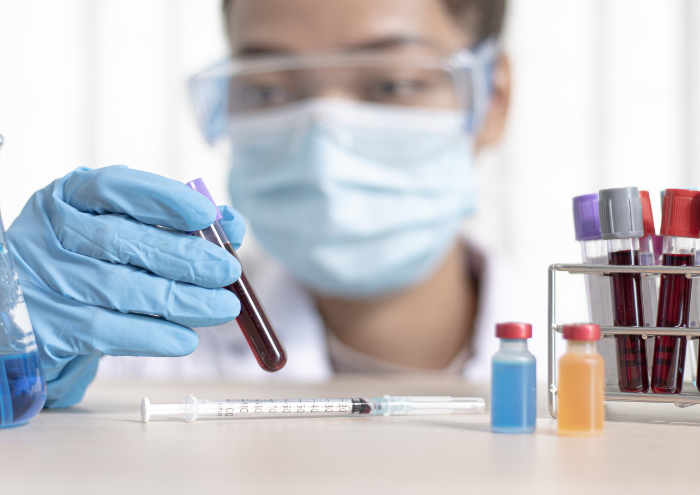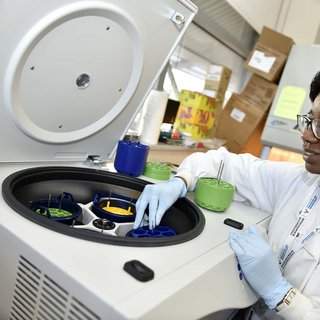Booster vaccines: How we helped make the research happen
Beating blood cancer isn't just about spending money on research, but bringing the right people together at the right time. In this blog, we explain how we helped make booster vaccine research happen and how we see ourselves as a convener of research as well as a funder.

Supporting people with blood cancer and campaigning for better care are important parts of our work, but at our heart we are a research charity.
It was belief in the power of research that led Susan Eastwood’s family to start raising money in 1960, and today we continue to be driven by the belief that it will be research that gets us to the point when blood cancer is finally beaten.
When it comes to the research we fund, the science may be complicated, but the idea of what we do is simple:
1) People raise money,
2) We use that money to fund researchers,
3) Those researchers find out new things,
4) Those discoveries are then used to develop better treatments, so more people with blood cancer get to live longer, better quality lives.
But as well as funding the research ourselves, an important part of our research strategy is how we encourage others to fund it, too. This is a vital part of the work we do as a charity, and it’s had particular significance over the course of the pandemic.
We’ve been lobbying policy-makers to fund research to give people with blood cancer an exit strategy out of the pandemic. A recent example of this is our work into ensuring research into vaccine boosters for people with blood cancer gets properly funded. It is a good example of how our involvement can be important even when we’re not paying for research ourselves.
Government announcement on Covid booster vaccines
By the time the Government announced funding for research into booster jabs, the research we funded had already shown the antibody response in people with blood cancer improved between the first and second doses.
We also saw that people with blood cancer who had already had Covid seemed to have a stronger vaccine response than those who hadn’t. So that gave us reason to think booster jabs might be important for our community.
Yet when the Government announced it was funding a trial called COV-BOOST into booster jabs, people with blood cancer were specifically excluded from taking part.
This was understandable – the question the Government wanted to answer was whether it was worth doing a booster programme for the general public, and so including people with compromised immune systems might skew the results.
And given it was already clear that people with compromised immune systems would be the first priority for a booster jab, the thinking went, why do you need to do specific research in this group?
But our view was that unless we understand booster efficacy in people with blood cancer, we cannot advise them on how careful they still need to be once they have had their booster.
The booster jabs might give some people with blood cancer good protection, and we want to avoid a situation where we have to advise them to continue being cautious because the research wasn’t done to give us these answers.
Covid booster vaccines and blood cancer
The COV-BOOST trial is being led by Southampton University, and we already have good relationships with researchers there.
The Blood Cancer UK Vaccine Research Collaborative is currently funding two studies at Southampton:
- Dr Sean Lim's study is looking at how effective the first two Covid vaccines are for people with lymphoma, and
- Dr Beth Stuart's study is combining all the vaccine efficacy data from the individual research projects we are funding into one big study.
We met with Professor Jonathan Van Tam and the team funding COV-BOOST, and made the case for it to be extended to include people who were clinically extremely vulnerable, which would include people with blood cancer.
Professor Van Tam saw value in the idea, but wanted to be assured our approach would lead to results ahead of the booster programme roll-out in the Autumn. He rightly argued that it was only worth spending money on if it reported in time to inform policy or the advice we give.
This led to the OCTAVE-DUO study being set up
We brought together a group of researchers to work out how we might be able to do high-quality research on this quickly. Separately, some of the researchers who are carrying out a Government-funded vaccine effectiveness study called OCTAVE-DUO told us they were planning to put in a proposal to the Medical Research Council (MRC) to fund some work in this area.
We spoke to them about bringing our idea and theirs together, and we were jointly able to get the Government and the MRC to agree to fund half of the work each. This culminated in a study being set up called OCTAVE-DUO, which will look at the effect of booster doses across several groups of immune compromised patients.
The OCTAVE-DUO study is now recruiting blood cancer patients who were previously involved in vaccine research. The blood cancer strand of OCTAVE-DUO is being led by Dr Sean Lim at Southampton University (who is already leading some of our initial vaccine efficacy work) and Professor Gordon Cook in Leeds.
How will it work?
The work will include giving a booster vaccine dose to people who have had a low antibody response to the first two vaccines and will include people with lymphomas, chronic lymphocytic leukaemia, or myeloma.
There will be a separate group of people studied who have had a stem-cell transplant or CAR-T cell therapy. Given the need to do this quickly, we are expecting results in September. This will mean that when people with blood cancer get their booster jab, they will have a better idea of how much protection they might get from it.
It’s difficult to put a financial figure on how much this work costs, because the OCTAVE-DUO trial will include more people than just people with blood cancer, but this equates to hundreds of thousands of pounds of blood cancer research that would not have happened if we had not been part of the conversation.
And this work is only possible because of the initial vaccine research funded by us and several others looking at how well the vaccines work people with blood cancer. Without those initial findings, and showing that antibody response improved between the first and second vaccine dose, none of this would have been possible.
This shows that beating blood cancer through research isn’t just about how much money we can spend on research. It’s also about bringing people together to ensure research is funded and led by the right people over the right time frame. By continuing to do this, we can have an impact that goes far beyond what we can measure in pounds and pence.

